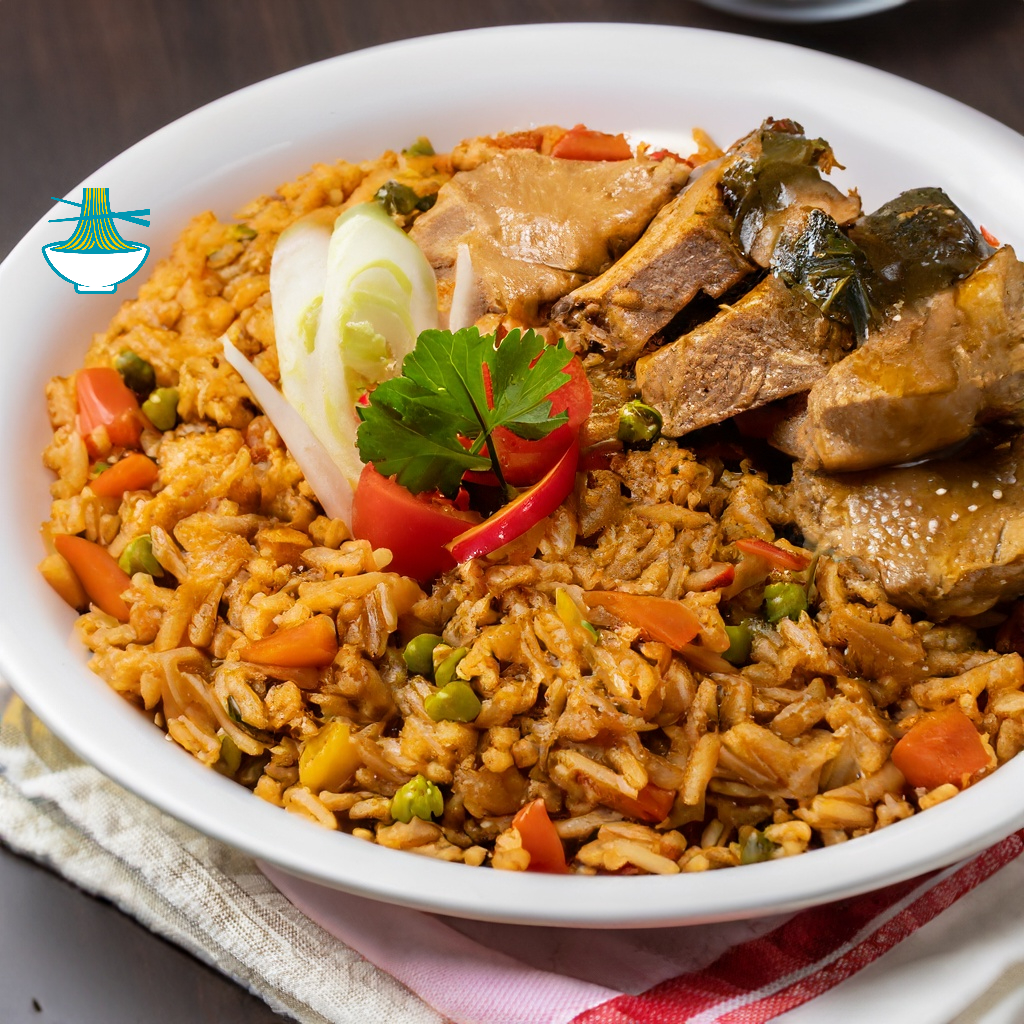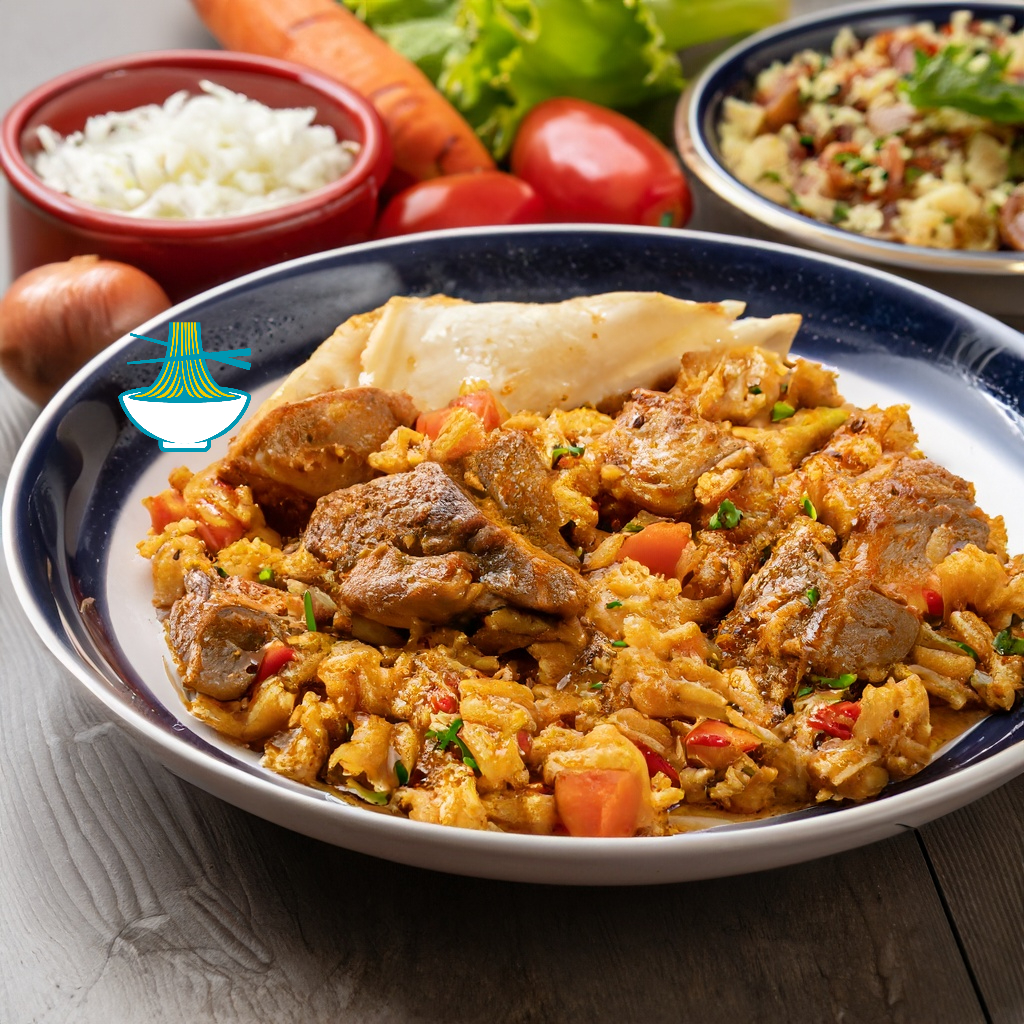Authentic Afghan Mastawa is a cherished traditional dish featuring slow-cooked lamb or beef, rice, and vegetables, infused with aromatic spices such as cinnamon, cardamom, and cumin. This hearty meal, deeply rooted in Afghan culture, is often prepared for family gatherings, weddings, and celebrations, symbolizing hospitality and warmth. Rich in protein, carbohydrates, and essential vitamins like B-complex and iron, Mastawa supports energy and overall health. However, its high-calorie content from fats and red meat may not suit those with dietary restrictions. Typically served with yogurt or fresh herbs, this dish balances indulgence with a touch of freshness, making it a true culinary treasure.

ingredients:
1. 2 cups basmati rice
2. 1 pound lamb or beef, cut into small pieces
3. 1 onion, diced
4. 4 cloves garlic, minced
5. 1 cup carrots, sliced
6. 1 cup peas
7. 1 cup green beans
8. 1 tablespoon tomato paste
9. 2 tablespoons vegetable oil
10. 1 teaspoon salt
11. 1 teaspoon black pepper
12. 1 teaspoon ground cumin
13. 1 teaspoon ground coriander
14. 1 cinnamon stick (optional)
15. 4 cups water
Method:
1. Rinse the basmati rice until the water runs clear. Soak it in cold water for 30 minutes.
2. In a large pot, heat the vegetable oil over medium heat. Add the diced onion and cook until soft and translucent, about 5 minutes.
3. Add the minced garlic and cook for another minute, stirring frequently.
4. Add the lamb or beef to the pot and brown it on all sides for about 5 minutes.
5. Stir in the sliced carrots, peas, and green beans, cooking for an additional 5 minutes.
6. Add the tomato paste, salt, black pepper, cumin, coriander, and cinnamon stick (if using), mixing well.
7. Drain the rice and add it to the pot, stirring to combine with the meat and vegetables.
8. Pour in 4 cups of water, bring the mixture to a boil, then reduce the heat to low.
9. Cover the pot and let it simmer for 20–25 minutes, or until the rice is fully cooked and the liquid has been absorbed.
10. Once cooked, remove the pot from the heat and let it rest for 5–10 minutes.
11. Fluff the rice with a fork and serve, garnished with fried onions, yogurt, or fresh herbs if desired.
Serving Suggestions:
Mastawa is often served with yogurt or fresh herbs such as parsley or cilantro. It can also be garnished with fried onions or raisins for added flavor and texture.

frequently asked questions (FAQs)
1. Can the meat be substituted with other ingredients like chicken or plant-based alternatives?
- Yes, the meat in Afghan Mastawa can be easily substituted based on dietary preferences or restrictions. You can replace the lamb or beef with chicken for a lighter option. If you're looking for plant-based alternatives, vegetables like mushrooms, lentils, or chickpeas can be used to mimic the texture and richness of the meat. Tofu or tempeh can also be added for additional protein in a vegetarian or vegan version.
2. What ingredients can be modified to make this dish lower in fat or calories?
To make Mastawa lower in fat or calories, you can make a few simple adjustments:
- Use leaner meat: Opt for lean cuts of lamb or beef, or replace the meat with skinless chicken breast or turkey to reduce fat content.
- Reduce or eliminate the vegetable oil: Use a smaller amount of oil or substitute with a healthier option like olive oil. You can also consider using a non-stick pan to minimize oil usage.
- Increase the vegetables: Adding more carrots, peas, and green beans can boost the fiber content and reduce the overall calorie density of the dish.
- Reduce the rice portion: If you're looking to cut calories further, you can reduce the amount of rice or substitute with a whole grain like quinoa or bulgur, which may offer additional nutritional benefits.
3. How can this dish be prepared for individuals with allergies to certain ingredients, like gluten or lactose?
- For individuals with gluten intolerance, Afghan Mastawa is naturally gluten-free since the dish does not contain wheat-based products. However, if any side dishes or condiments contain gluten (such as certain types of yogurt or bread), you should use gluten-free alternatives.
- For those with lactose intolerance, the traditional yogurt served with Mastawa can be replaced with lactose-free yogurt or dairy-free alternatives such as coconut yogurt, almond milk-based yogurt, or soy-based yogurt. Always check the labels of any products to ensure they meet specific dietary needs.
4. Are there different ways to cook or serve this dish for various occasions?
- Yes, there are different variations of Mastawa that can be adapted for specific occasions:
- For festive occasions or larger gatherings, you might choose to prepare a larger batch or add more luxurious ingredients such as nuts (like almonds or cashews) and dried fruits (such as raisins or apricots) to add texture and sweetness.
- For a quick meal, you can simplify the recipe by using pre-cooked or leftover meat and shortening the cooking time, allowing the dish to come together faster.
- Serving variations: Mastawa can be served with a variety of sides depending on the occasion. For example, it is commonly paired with fresh herbs like cilantro or parsley for added freshness. It can also be garnished with fried onions for crunch or a sprinkle of pomegranate seeds to add a burst of flavor and color.
5. Can this dish be stored for long periods, and what are the best methods for preserving it?
Mastawa can be stored and preserved for future meals:
- Refrigeration: Leftover Mastawa can be stored in an airtight container in the refrigerator for up to 3-4 days. Ensure that the dish cools completely before refrigerating to maintain freshness.
- Freezing: Mastawa can also be frozen for longer storage. To freeze, place the cooled dish in an airtight container or heavy-duty freezer bag and store it for up to 2-3 months. When ready to eat, thaw it overnight in the fridge and reheat thoroughly before serving.
- Reheating tips: When reheating, add a splash of water or broth to prevent the rice from drying out. You can also reheat it in the microwave or on the stove, stirring occasionally to ensure even heating.
Nutrition Value:
1. 2 cups basmati rice
- Calories: 480
- Carbohydrates: 108g
- Protein: 8g
- Fat: 0g
- Sodium: 0mg
- Cholesterol: 0mg
- Vitamins: Low in vitamins, primarily B vitamins
- Minerals: Provides iron and magnesium
- Nutritional benefit: Rich in carbohydrates for energy and low in fat.
2. 1 pound lamb or beef, cut into small pieces
- Calories: 760-800 (varies by cut)
- Carbohydrates: 0g
- Protein: 80-90g
- Fat: 50-60g (varies by cut)
- Sodium: 80mg (varies by cut)
- Cholesterol: 100mg (varies by cut)
- Vitamins: Rich in B vitamins, particularly B12
- Minerals: High in iron and zinc
- Nutritional benefit: Excellent source of protein and iron.
3. 1 onion, diced
- Calories: 44
- Carbohydrates: 10g
- Protein: 1g
- Fat: 0g
- Sodium: 3mg
- Cholesterol: 0mg
- Vitamins: High in vitamin C and B6
- Minerals: Contains small amounts of potassium and manganese
- Nutritional benefit: Rich in antioxidants and vitamins.
4. 4 cloves garlic, minced
- Calories: 16
- Carbohydrates: 4g
- Protein: 1g
- Fat: 0g
- Sodium: 1mg
- Cholesterol: 0mg
- Vitamins: Contains vitamins C and B6
- Minerals: Rich in manganese and calcium
- Nutritional benefit: Known for antibacterial and antiviral properties.
5. 1 cup carrots, sliced
- Calories: 52
- Carbohydrates: 12g
- Protein: 1g
- Fat: 0g
- Sodium: 43mg
- Cholesterol: 0mg
- Vitamins: High in vitamin A (from beta-carotene)
- Minerals: Contains potassium and small amounts of calcium
- Nutritional benefit: Great source of beta-carotene for eye health.
6. 1 cup peas
- Calories: 62
- Carbohydrates: 11g
- Protein: 4g
- Fat: 0g
- Sodium: 5mg
- Cholesterol: 0mg
- Vitamins: Rich in vitamin K and vitamin C
- Minerals: Provides manganese, phosphorus, and iron
- Nutritional benefit: Good source of fiber and protein.
7. 1 cup green beans
- Calories: 44
- Carbohydrates: 10g
- Protein: 2g
- Fat: 0g
- Sodium: 6mg
- Cholesterol: 0mg
- Vitamins: High in vitamins C and K
- Minerals: Contains manganese and potassium
- Nutritional benefit: Low in calories, high in vitamins and fiber.
8. 1 tablespoon tomato paste
- Calories: 13
- Carbohydrates: 3g
- Protein: 0.6g
- Fat: 0.1g
- Sodium: 7mg
- Cholesterol: 0mg
- Vitamins: Contains small amounts of vitamins A and C
- Minerals: Provides potassium and magnesium
- Nutritional benefit: Rich in lycopene, an antioxidant.
9. 2 tablespoons vegetable oil
- Calories: 240
- Carbohydrates: 0g
- Protein: 0g
- Fat: 28g
- Sodium: 0mg
- Cholesterol: 0mg
- Vitamins: Contains vitamin E
- Minerals: Contains small amounts of vitamin K
- Nutritional benefit: Source of unsaturated fats for heart health.
10. 1 teaspoon salt
- Calories: 0
- Carbohydrates: 0g
- Protein: 0g
- Fat: 0g
- Sodium: 2,300mg
- Cholesterol: 0mg
- Vitamins: 0mg
- Minerals: 0mg
- Nutritional benefit: Necessary for electrolyte balance, should be consumed in moderation.
11. 1 teaspoon black pepper
- Calories: 6
- Carbohydrates: 1.4g
- Protein: 0.3g
- Fat: 0.2g
- Sodium: 0mg
- Cholesterol: 0mg
- Vitamins: Contains small amounts of vitamin K
- Minerals: Provides manganese
- Nutritional benefit: Contains piperine, may improve digestion.
12. 1 teaspoon ground cumin
- Calories: 8
- Carbohydrates: 1g
- Protein: 0.4g
- Fat: 0.4g
- Sodium: 0mg
- Cholesterol: 0mg
- Vitamins: Contains small amounts of vitamin E
- Minerals: Provides iron and manganese
- Nutritional benefit: Rich in antioxidants, may help improve digestion.
13. 1 teaspoon ground coriander
- Calories: 0
- Carbohydrates: 0g
- Protein: 0g
- Fat: 0g
- Sodium: 0mg
- Cholesterol: 0mg
- Vitamins: 0mg
- Minerals: 0mg
- Nutritional benefit: High in vitamins A, C, and K, may promote healthy skin.
14. 1 cinnamon stick (optional)
- Calories: 6
- Carbohydrates: 2g
- Protein: 0g
- Fat: 0g
- Sodium: 0mg
- Cholesterol: 0mg
- Vitamins: Contains small amounts of vitamin K
- Minerals: Provides calcium and manganese
- Nutritional benefit: Antioxidant properties, may help regulate blood sugar levels.
15. 4 cups water
- Calories: 0
- Carbohydrates: 0g
- Protein: 0g
- Fat: 0g
- Sodium: 0mg
- Cholesterol: 0mg
- Vitamins: 0mg
- Minerals: 0mg
- Nutritional benefit: Essential for hydration and overall health.
Please note that the nutrition facts may vary depending on the specific brands used and the cooking methods. These values are approximate and should be used as a general guideline.
Mastawa is a filling and nutritious dish that is perfect for a family meal or special occasion. With its hearty combination of rice, meat, and vegetables, it provides a good source of protein, fiber, and essential vitamins and minerals.


Comments